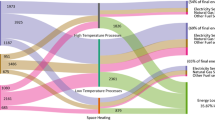Abstract
Seeking a potential of low carbon-based energy use for additive manufacturing, we present a preliminary experimental test using open source IoT tools on FDM (Fused Deposit Modelling) type of 3D printing. In our test we determine and categorize the electricity consumption of processes of a commercial grade FDM printer using a custom-built energy monitor. Our tests indicate that this model of FDM type 3D printer consumes between 22%–33% more energy when printing vertical volumes (Z-axis on 3D printing plate). Based on these tests we present a potential for IoT based low carbon FDM 3D printing using open-source data, hardware and software. With this the article’s contribution is two-fold. One as a study on energy and environmental impact of additive manufacturing and secondly as a potential and scope for IoT applications for facilitating low carbon additive manufacturing.
Access this chapter
Tax calculation will be finalised at checkout
Purchases are for personal use only
Similar content being viewed by others
References
Khosravani, M.R., Reinicke, T.: On the environmental impacts of 3D printing technology. Appl. Mater. Today 20, 100689 (2020). https://doi.org/10.1016/j.apmt.2020.100689
Annibaldi, V., Rotilio, M.: Energy consumption consideration of 3D printing. In: 2019 II Workshop on Metrology for Industry 4.0 and IoT (MetroInd4.0 IoT), pp. 243–248 (2019). https://doi.org/10.1109/METROI4.2019.8792856
Ajay, J., Rathore, A.S., Song, C., Zhou, C., Xu, W.: Don’t forget your electricity bills! An empirical study of characterizing energy consumption of 3D printers. In: Proceedings of the 7th ACM SIGOPS Asia-Pacific Workshop on Systems, Association for Computing Machinery, New York, USA, pp. 1–8 (2016). https://doi.org/10.1145/2967360.2967377
Peng, T.: Analysis of energy utilization in 3D printing processes. Procedia CIRP. 40, 62–67 (2016). https://doi.org/10.1016/j.procir.2016.01.055
Szemeti, G., Ramanujan, D.: An empirical benchmark for resource use in fused deposition modelling 3D printing of isovolumetric mechanical components. Procedia CIRP. 105, 183–191 (2022). https://doi.org/10.1016/j.procir.2022.02.030
Simon, T.R., Lee, W.J., Spurgeon, B.E., Boor, B.E., Zhao, F.: An Experimental Study on the Energy Consumption and Emission Profile of Fused Deposition Modeling Process. Procedia Manuf. 26, 920–928 (2018). https://doi.org/10.1016/j.promfg.2018.07.119
Yoon, H.-S., et al.: A comparison of energy consumption in bulk forming, subtractive, and additive processes: review and case study. Int. J. Precis. Eng. Manuf. Green Technol. 1(3), 261–279 (2014). https://doi.org/10.1007/s40684-014-0033-0
Baumers, M., Tuck, C., Wildman, R., Ashcroft, I., Hague, R.: Shape complexity and process energy consumption in electron beam melting: a case of something for nothing in additive manufacturing? J. Ind. Ecol. 21, S157–S167 (2017). https://doi.org/10.1111/jiec.12397
Thøgersen, J., Nielsen, K.S.: A better carbon footprint label. J. Clean. Prod. 125, 86–94 (2016). https://doi.org/10.1016/j.jclepro.2016.03.098
Tranberg, B., Corradi, O., Lajoie, B., Gibon, T., Staffell, I., Andresen, G.B.: Real-time carbon accounting method for the European electricity markets. Energ. Strat. Rev. 26, 100367 (2019). https://doi.org/10.1016/j.esr.2019.100367
Salzillo, G., Rak, M., Moretta, F.: Threat modeling based penetration testing: the open energy monitor case study. In: 13th International Conference on Security of Information and Networks, Association for Computing Machinery, New York, USA, pp. 1–8 (2020). https://doi.org/10.1145/3433174.3433181
Rak, M., Salzillo, G., Granata, D.: ESSecA: an automated expert system for threat modelling and penetration testing for IoT ecosystems. Comput. Electr. Eng. 99, 107721 (2022)
Tmrow.co: Live 24/7 CO2 emissions of electricity consumption. http://electricitymap.tmrow.co. Accessed 02 May 2022
Author information
Authors and Affiliations
Corresponding author
Editor information
Editors and Affiliations
Rights and permissions
Copyright information
© 2022 The Author(s), under exclusive license to Springer Nature Switzerland AG
About this paper
Cite this paper
Pokorniecki, D., Acharya, K. (2022). Experiment to Scope Low Carbon Electricity Based Additive Manufacturing with IoT. In: González-Vidal, A., Mohamed Abdelgawad, A., Sabir, E., Ziegler, S., Ladid, L. (eds) Internet of Things. GIoTS 2022. Lecture Notes in Computer Science, vol 13533. Springer, Cham. https://doi.org/10.1007/978-3-031-20936-9_33
Download citation
DOI: https://doi.org/10.1007/978-3-031-20936-9_33
Published:
Publisher Name: Springer, Cham
Print ISBN: 978-3-031-20935-2
Online ISBN: 978-3-031-20936-9
eBook Packages: Computer ScienceComputer Science (R0)




